- Home
- Martin Cruz Smith
Three Stations: An Arkady Renko Novel Page 5
Three Stations: An Arkady Renko Novel Read online
Page 5
Estimated Time of Death: by core temperature and start of rigor approximately 2 to 3 hours previous
Her ribs snapped with the sound of green wood cracking Arkady read on.
Observations: The deceased was delivered at 0216 dressed in a blue jacket of synthetic material and a white cotton bustier. Two plastic bags arrived with the body. Bag A contained items found on site: a blue denim skirt with decorative stitching and knee-high red boots of faux leather. Underpants were retrieved from an upper bunk in the trailer. Bag B held personal effects that included cosmetics, pepper spray, diaphragm, douche and an aspirin bottle that contained a yellow powder that preliminary toxicological examination has tentatively identified as clonidine, a blood pressure medication sometimes abused as a “knockout” pill.
UV radiation was used to examine the body, jacket and bustier for fingerprints, semen or blood. The result was negative. No bruising, stains or signs of forcible sexual entry. No signs of strangulation either manual or ligature. Bands of pale skin indicated the recent removal of rings from the 3rd, 4th and 5th fingers of the left hand and the 3rd and 4th fingers of the right. The deceased exhibited superficial dirt on her hands and face.
Body in excellent physical condition. Distinguishing marks: tattoo on cusp of left hip. No scars or birthmarks or occupational calluses. No evident lacerations or contusions. No signs of struggle or defensive wounds. No hypodermic needle tracks. No body piercing except earlobes. Material under fingernails was unremarkable.
Willi paused to ask Arkady, “You okay?”
“I’m fine.”
Arkady was eight years old on his first visit to a morgue. His father took him to toughen him up. Arkady remembered the general slapping a dead man on the ass and declaring, “He served under me in Kursk!” Some men could saunter into a morgue and browse autopsy tables like a garden show. Arkady had never attained such sangfroid. After twenty years as an investigator he was still as embarrassed by an eviscerated body as if he had caught someone undressed.
With the ribs out of the way Willi detached the girl’s heart and lungs and put them together, en bloc, into a pail held by Arkady. In other pails went other organs, wet and glistening as strange sea creatures.
Next, up or down? Up it was.
Olga’s hair was thick and vigorous, but with a hairbrush and comb Willi created a part from ear to ear, retraced the part with a scalpel and peeled the top half of the face down to the chin from a red skull and startled eyes.
While Willi sawed, Arkady’s mind wandered. He thought about vodka, about Victor’s limitless thirst and the half-empty bottle found with Olga. A dirty mattress in a workers’ wagon didn’t seem appealing even for a prostitute. Yet they hadn’t run in and out. Olga and her friend had opened a bottle and stayed long enough for one to dope the other. A toast! How do you toast without glasses? Arkady thought about the tattoo’s deep colors and distinct lines, the work of a professional, not a prison camp lifer working with an unsterilized needle and paid for in cigarettes. What species was Olga’s butterfly? The writer Nabokov had always been enchanted by “blues,” a category of butterflies that were small and drab until they flew and then their wings were iridescent.
Willi repaired the damage. He sewed the body together with twine and the scalp together with black sutures although the girl was largely a hollow, her organs set aside in buckets and bowls and her brain deposited in a jar of formalin to harden enough to slice, which would take at least a week. Quite a night for Olga, Arkady thought. First she is killed and then she is rearranged. Maybe cannibals lurked around the corner.
Soaked with perspiration, Willi dropped onto a stool next to the table, two fingers monitoring the pulse in his neck, giving Arkady a few seconds to worry about Zhenya. Was he running with a street gang? Arrested for hustling? Beaten to death by a sore loser? With Zhenya, anxiety was on tap twenty-four hours a day.
Willi shook his head. “Steady as a Swiss watch.”
“Do you really want to die in the middle of an autopsy? Why don’t you just run around the block?”
“I hate exercise.”
Willi poured more alcohol and this time Arkady joined him. It went down smoothly and then set his throat on fire.
“Needs lemon.”
Voices came from the hall of body drawers and Willi straightened up. When the sound subsided he asked Arkady, “Is there anything you want to add to the chart? Anything I missed?”
Since pathologists were used to having the final say, Arkady chose his words carefully.
“You mention the dirt under her fingernails but you don’t mention that her nails are manicured. Same with her toenails.”
“Women paint their nails. Since when is that worth mentioning?”
“Her clothes.”
“She dressed like a slut.”
“Her outfit was shabby but it was new. The boots were poor quality but they were also new.”
“You’re thinking far too much about this girl.”
“Then there’s the lack of bruises and scratches, the wear and tear that a person accumulates from having sex with nasty customers in alleyways and trailers.”
Willi blew a smoke ring in Arkady’s direction. “Old friend, take it from a man with one foot in the grave, everything is contradictory. Stalin was good then bad then good again. Once I was thin as a reed and now I’m a human globe with a belt as my equator. In any case, don’t be distressed over a dead prostitute. There’s a new one every day. If she isn’t claimed she will make some medical student very happy, and if someone claims her, I’ll let you know. This was my last autopsy.”
“Too bad it was a failure,” Arkady said.
Willi reacted as if slapped. “What do you mean by that?”
“An autopsy is supposed to determine the cause of death. You failed.”
“Arkady, I found what was there. I can’t manufacture evidence.”
“You missed it.”
They were interrupted by the arrival of the morgue director and a woman in a black shawl. The director was surprised by the sight of Willi and Arkady but regained enough poise to lead her around the autopsy tables with the smoothness of a maître d’. She strode. She was one of those women who seemed to have been bronzed at her peak, forty going on thirty, in dark glasses and shadowy silk. She gave Willi and Arkady no more than a glance.
The director led her to the table of the suicide and after a sympathetic cough asked if she could identify the body.
The woman said, “This is Sergei Petrovich Borodin. My son.”
Even drained of color, Sergei Borodin was handsome, with longish hair that still seemed damp from the bath. He was about twenty years old, lean through the chest and muscular from the waist down. His mother’s emotion was hidden by her dark glasses but Arkady assumed grief was involved. She took her dead boy’s hand and turned his wrist to a decisive slash.
Meanwhile the director explained the cost of generating a death certificate for a bathroom fall. The paramedics who found the body would have to change their reports. They would expect to be rewarded. In the meantime the morgue was willing to store the body for a fee.
“To rent a drawer?”
“A refrigerated drawer that size…”
“Of course. Go on.”
“In these circumstances I would suggest a generous donation to the church for a service in his name and a Christian burial.”
“Is that it?”
“And your son’s certificate of residence.”
“He had no certificate of residence. He was a dancer. He stayed with friends and other artists.”
“Even artists must obey the law. I’m sorry, there will be a fine.”
She turned her son’s wrist to the director. “I won’t make a fuss if you sew this.”
He was eager to redeem himself. “It’s no problem. Is there anything else we can do?”
“Burn him.”
The director paused. “Cremate him? We don’t do that here.”
“Then arrange it.�
��
Like a thunderclap, Willi sneezed. The woman’s attention snapped to him and then to Arkady. She removed her dark glasses to see better and her dry eyes were more naked than anything else in the room. Then at full speed she was gone, the director at her heels.
“I’m sorry,” Arkady said. “I’m afraid I put you in a bad spot.”
“The hell with it. I hate sleeping on a sofa.” Willi was in surprisingly high spirits.
“And, besides your heart problems, now you have a cold?”
“No. Something tickled my nose. Something penetrated this atmosphere of putrefaction and formaldehyde. A trained nose is important. Every schoolboy should recognize the smell of garlic for arsenic and almonds for cyanide. Hand me the lungs. Let’s discover what your lady friend last breathed.”
Arkady transferred from pail to tray the girl’s heart and lungs still attached, a fist of muscle between two spongy loaves. He smelled nothing that penetrated the usual miasma until Willi sliced the left lung and released a sweet whiff.
“Ether.”
“Ether exactly,” Willi agreed. “It’s taking a while to dissipate because she didn’t breathe again. So it was in two stages: clonidine to knock her out and ether to anesthetize and kill her, all without a struggle. Congratulations, you have a murder.”
Arkady’s cell phone chimed twice only, and by the time he freed himself from the autopsy apron and dug the phone out of a pocket, he had missed a call from Zhenya, the first communication from the boy in a week. Arkady immediately returned the call but Zhenya didn’t answer, which struck Arkady as a fair example of their relationship.
Or that whatever Zhenya had called about was fleeting and unimportant.
7
Maya sat at the vanity in a Peter the Great restroom with a towel over her shoulders while Zhenya shaved her head. She had cut off her red hair with office scissors but there were places she couldn’t see or reach with a razor, and although she resented the forced intimacy of the situation, she bowed her head while Zhenya scraped away with a razor from the dealers’ lounge. Cutting her hair was his idea; her red hair as good as pointed her out to the militia. Now she was as bald as a chick.
“Did you ever shave anyone’s head before?”
“No.”
“Have you ever shaved yourself?”
“No.”
“That’s what I thought.”
They had barely slept because she wanted to meet the six-thirty train at Yaroslavl Station, the same train that she had been on, hopefully with the same crew. Auntie Lena had claimed she was such a regular passenger that people knew her up and down the line. Maybe someone did.
The mirror doubled her misery. She imagined the kind of women usually reflected in such looking glasses as tall and sophisticated, drinking champagne as they gambled, laughing lightly whether they won or lost. Why not? They had better odds at roulette than she had of finding her baby.
She asked, “Why isn’t anyone here?”
“The Peter the Great Casino has been closed for weeks. A lot of casinos are closed.”
“Why?”
“Arkady says Moscow wants to project a dignified image like other world capitals. He says someone in the Kremlin noticed that there aren’t any slot machines on the steps of the White House or Buckingham Palace.”
She wondered why anyone would steal a baby. What did they do with babies? How could she have gone to sleep and let her baby be stolen? She didn’t ask for these questions, they came unbidden ten times a second. Which reminded her how her breasts ached; she would have to milk herself like a cow before she left for the station. She had made up her mind that Zhenya was staying behind. He meant well but it was like having a squirrel on her shoulder, and, although it was irrational to blame Zhenya, the sight of her hair falling into a wastebasket was as depressing as losing her name.
She asked, “You and Yegor are friends?”
“We have a business arrangement.”
“What does that mean?”
“I play chess for money. It’s a business that’s easily disrupted. I pay Yegor for protection.”
“From who?”
“From Yegor, basically.”
“You punk out to him? You don’t defend yourself?”
“It’s a business expense. It’s hard to play chess when four guys jump you and another kicks the board. If more people learned how to play without a board, there wouldn’t be a problem. I could teach you.”
“To punk out? No, thanks. Maybe I should ask Yegor for help.”
“I wouldn’t advise it.”
“Why?”
“He thinks you’re attractive.”
“Are you jealous?”
Zhenya concentrated solemnly on the crown of her skull. Her scalp was coming up a faint blue and as smooth as a billiard ball.
“Just avoid him.”
“Have you ever had a girlfriend?”
He didn’t have any answer to that. He might be a genius but he was also a virgin. She could tell by how timidly he blew cuttings from the nape of her neck.
“So Yegor is the guy in charge.”
“He thinks he’s in charge.”
“Why didn’t you ask him about my baby?”
“The less you see of Yegor the better.”
“You could have asked.”
Yegor’s name was a drop of ink in water. Everything took a darker shade.
She asked, “So how come you have the run of this place?”
“I know the combination for the keypad.”
“You are such a liar. Anyway, nobody plays chess for money.”
“How would you know what people do in Moscow?”
That let her know that she was a peasant. They finished the rest of the shave in silence until Zhenya toweled her off.
“Do you want to take a look in the mirror?”
“No. Is there a refrigerator here?”
“An ice bin at the bar. We’ve got everything. Nuts, pretzels, chips—”
“Can you get me a glass and napkins and then leave me alone?”
From the vantage point of the casino Zhenya watched Maya push through the early-morning crowds of Three Stations. The rain made cars appear to crawl over one another. Yesterday Maya had been a flamboyant rebel in red. Today she was a gray figure with a knit cap pulled over a shaved head, as common as a crow. Without a backward glance she went down the steps of the underpass and disappeared.
He did consider calling Arkady but to tell him what? That a mental case searching for an imaginary baby didn’t want his help? She had come and gone like a bad dream, taking his knife with her. The only other evidence of her visit was a nest of dyed hair in a wastebasket and in the bar fridge a quarter glass of mother’s milk. He shouldn’t have taken Maya in. What was he thinking? Not even Arkady knew about this hideaway. No one knew that it was his.
Before the crackdown the casino had buzzed with color. Outside, a neon Peter the Great had opened and closed the lid of a neon chest heaped with crown jewels. Inside, players were welcomed by the lifelike wax figure of Peter, all seven feet of him in a mantle of golden threads trimmed in fur, indicating with an outstretched arm the way to the high-stakes tables, although from certain angles there was something familiar in the twist of his mouth that inspired the nickname Putin the Great.
At that time Zhenya’s only connection to the Peter the Great was a guard named Yakov who styled himself a serious chess player even though he knew no more than basic openings, like the diagrammed floor of a dance class. When he opened his jacket to be comfortable, a shoulder holster couldn’t help but peek out. Every Wednesday evening they played at the buffet in Yaroslavl Station, Yakov agonizing over every move because there seemed to be no plan of attack simple enough for him to remember. Zhenya toyed with him, letting him almost win, but it was impossible to lose to a man who consistently brought out his queen too soon and castled too late.
The last time they met, Zhenya noticed numbers written in ballpoint on the palm of Yakov’s han
d and asked if they were moves. At once Yakov went in the direction of the restroom to wash his hands. Zhenya paused the game clock and waited.
After half an hour he realized that the guard was not coming back. Zhenya paid for a sandwich he had not eaten, stuffed his chess paraphernalia into his daypack and ventured out to the square. Evening made the shabby stalls, kiosks and video game galleries busy and bright. All but Peter the Great. A neon replica of Czar Peter, Emperor of all the Russias, was unplugged, a black hole amid the glitter. Two uniformed militia officers stood at the casino’s front entrance.
No one knew the shortcuts and courtyards of Three Stations better than the runaways that Zhenya moved among. He slipped into the shadow of the neighboring courtyard, climbed a pyramid of tires to the top of the wall and lowered himself to the lid of a rubbish bin in the courtyard of the casino. The truck bay was shut from the back door and was guarded by a keyless lock with an illuminated numerical pad. Of course, when the casino was up and running, there would have been armed guards and security cameras.
The plate of the lock was brass, unscratched, absolutely new, necessitating a new combination that Yakov apparently had trouble remembering. All the same, was there a parallel system? A silent alarm or a wailing siren? Braced to run, Zhenya punched in the numbers he had glimpsed on Yakov’s hand and the door opened with a sigh.
Thus Zhenya claimed the Peter the Great Casino. Nothing unusual about it. So many runaways squatted in the railway cars, basements, empty buildings and construction sites of Moscow that the mayor called them “rats.” And although Zhenya was a trespasser, he felt at home. More so than in the rusting Khrushchev-era flats he had shared with his father or in any children’s shelter or being under Arkady’s eye.
Even if he had to live in it as quietly as a ghost, the casino was the first private place Zhenya had ever lived. And if they caught him what could the consequences be? He hadn’t vandalized the place; if anything, he took care of it.
Glossy brochures described the Peter the Great as only one star in a galaxy of entertainment venues offered by VGI, the Vaksberg Group International. Apparently VGI owned twenty other casinos in Moscow, some much grander than the Peter the Great, not to mention gaming establishments in London, Barbados and Dubai. A company like VGI had friends as well as enemies in the Kremlin. The standoff could go on for quite a while.

 Polar Star
Polar Star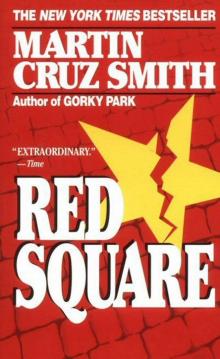 Red Square
Red Square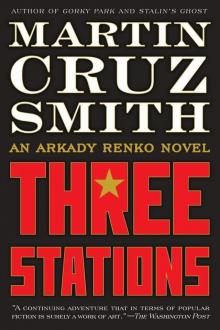 Three Stations
Three Stations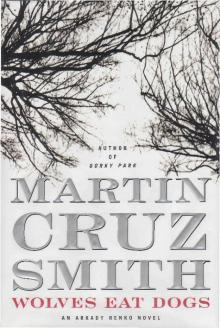 Wolves Eat Dogs
Wolves Eat Dogs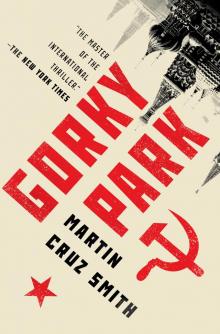 Gorky Park
Gorky Park December 6
December 6 Havana Bay
Havana Bay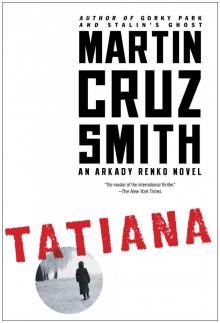 Tatiana
Tatiana The Girl From Venice
The Girl From Venice Stalin's Ghost
Stalin's Ghost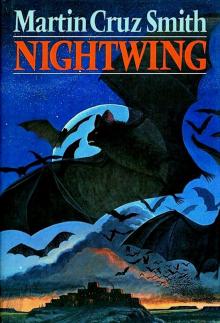 Nightwing
Nightwing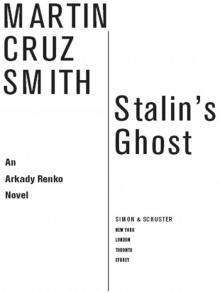 Stalin s Ghost
Stalin s Ghost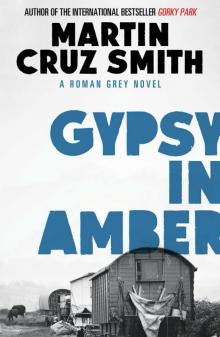 Gypsy in Amber
Gypsy in Amber Rose
Rose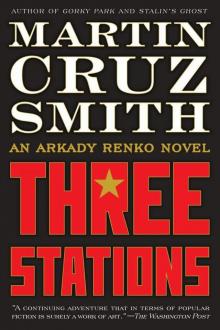 Three Stations: An Arkady Renko Novel
Three Stations: An Arkady Renko Novel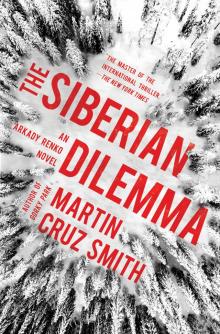 The Siberian Dilemma
The Siberian Dilemma December 6 (V5.0)
December 6 (V5.0)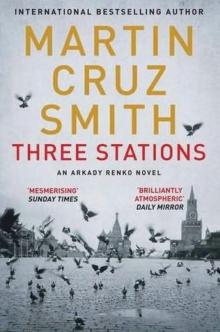 Three Stations ar-7
Three Stations ar-7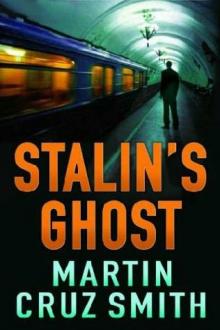 Stalin’s Ghost ar-6
Stalin’s Ghost ar-6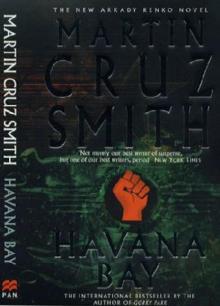 Havana Bay ar-4
Havana Bay ar-4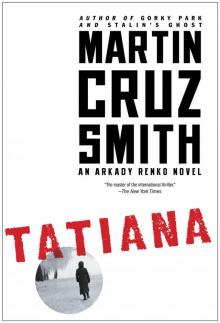 Tatiana ar-8
Tatiana ar-8